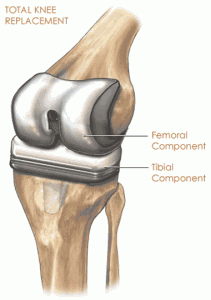 I recently read an article about a study looking at people who had had knee replacement surgery. The study showed that 30% gained weight afterward. I was actually surprised by this finding, because I figured people with a new knee would naturally want to be more active – especially if their old knee had kept them inactive for a long time.
I recently read an article about a study looking at people who had had knee replacement surgery. The study showed that 30% gained weight afterward. I was actually surprised by this finding, because I figured people with a new knee would naturally want to be more active – especially if their old knee had kept them inactive for a long time.
But I guess these researchers found that people got used to being inactive and stayed that way after surgery. They also found that people who lost weight prior to knee replacement surgery had a tendency to gain the weight back after surgery – maybe because they’d reached their goal and were done. I also wonder if the pain of surgery and physical therapy (or even the fear of pain) stops people from being active with their new knee.
Another point in the article is that health care providers may not do a good job explaining to knee replacement patients (before surgery) the importance of getting and staying active after surgery. One approach is to use physical therapy as a starting point and then stick with the routine of exercising three or even more times a week until it becomes a habit.
I wonder how often this phenomenon is happening in the real world – not just in one isolated study. Have you or anyone you know had a knee replacement surgery and then gained weight afterward? If so, what do you think caused that? If not, what helped you to get/stay active with your new knee? A lot of people with diabetes have knee replacement surgery every year, and I think it’s important for us as health care professionals to know how to help prepare people to achieve the best possible outcomes.
